This is a continuation of a review from my recent visit to the Artparis show here in Paris, on March 20. Here is Part 1.
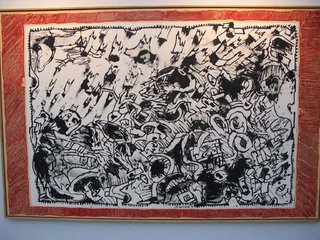 | After yesterday's installment on sculpture, you can be sure that Mark is asking, "What about the painting?" It's true that painting is not dead. In fact, it may be not only resurrected from the dead but gaining strength. I admired Pierre Alechinsky's Evènement géologique (Geological event, 2004/05), from Galerie Lelong. He made it with acrylic applied to a large piece of paper, giving it a sort of comic book look, taped down on a canvas. It looks like crushed pieces of stuff, the detritus of an earthquake, but the overall visual effect was less specific. |
| Catherine Lopès-Curval is a painter based in Paris, and Patrice Trigano was showing several of her paintings derived from Alice in Wonderland, with a black-haired woman in a bowl cut, which may be based on her self-portrait. There is a Magritte-inspired surrealist tinge to the work, as in this 2005 pair showing Alice in a tree. | 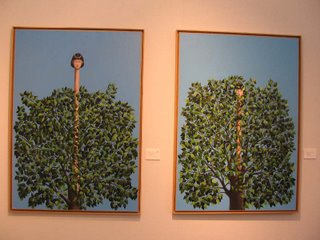 |
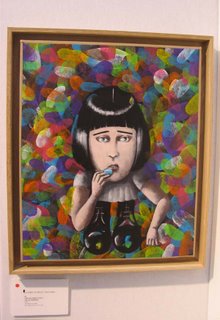 | My favorite of Catherine Lopès-Curval's Alice paintings was Alice psychédélique (2005), which combines the Alice story with psychedelic drugs. The background is based on the colorful designs of medications that also fascinated Fred Tomaselli and Damien Hirst. The little orange dot on its card means that it sold. |
| According to the review (Art Paris, l'effet Grand Palais, March 23) by Valérie Duponchelle for Le Figaro, Alice Pauli was selling the landscapes of Fabienne Verdier like hotcakes. Indeed, her simple paintings have great appeal, inspired by Japanese Zen and traditional Chinese landscape, with just a few broad strokes of black paint to suggest shapes. Many of them had orange dots. | 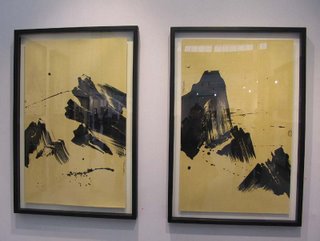 |
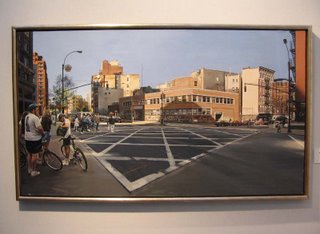 | I really admire the technical skill of photorealist painters, as I have many times in the work that Anna Conti writes about on her blog. It is the sort of virtuosic painting that inspires awe. The best example I saw in this show was an oil painting by Richard Estes, Avenue of the Americas at Spring Street, which may be an older work. |
| Jenny Watson's Mother and Dog (2004) is painted on wrapping paper with a gold-star pattern, loosely wrapped over a canvas, which is a common element of her work, along with her childlike drawing style. There is an art brut quality that I enjoy. |  |
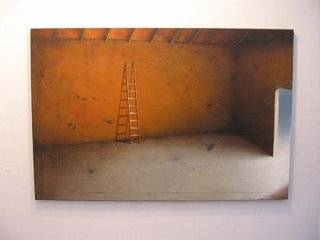 | I admired several of Fernando Adam's surrealist paintings, beginning with the female portraits that were only suspended dresses, accompanied by words in Spanish. Shown here is one of the empty interiors I also liked, Registros de silencio 4 (2006). These are in mixed media on canvas. |
| Ximo Lizana has a great name for an artist, and if her parents gave it to her, they did her career a big favor. Valencia's Galería Punto was showing her large digital photograph Frágil espejismo (2006), which is a beautiful and stomach-turning image. It fits right into her recent work, dealing often with violence against women, such as in her Crucified Woman (2004), shown on the entry page of her Web site. | 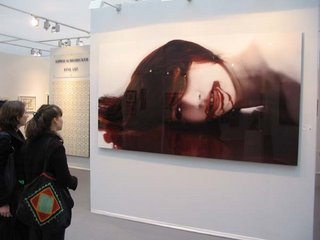 |
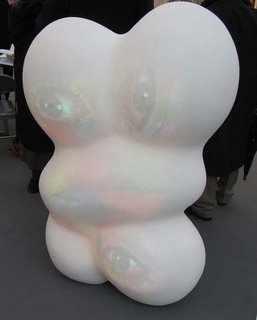 | By far, the creepiest piece in the show was a sound and projection sculpture by Tony Oursler called Bow, from 2003. It is a white fiberglass blob with several bulbous parts. A projector made eyes and a mouth appear in several different directions, and a sound track of murky speaking really brought the piece to life. In a disturbing way. |
Valérie Duponchelle's review (
Art Paris, l'effet Grand Palais, March 23) for
Le Figaro had some good comments about what the move to the Grand Palais means for Artparis (my translation):
The "Parisian fair" has done so well thanks to the Grand Palais phenomenon. Some 37,000 visitors, of whom a third were paying to get in (15€), jostled over five days to rediscover this lost sensation, art in the Grand Palais and in zenithal light. Jostling is a euphemism given the considerable security restrictions -- no more than 5,500 visitors at one time in the 13,000 restored square meters -- were a drawback for this return to historic Paris.
I agree wholeheartedly about experiencing the show in the Grand Palais: what a beautiful spot to view art, and what a tradition to which to be connected.

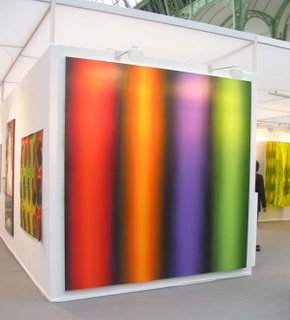






























































1 comment:
You got around in Paris. Good post. I agree, Oursler can be real creepy.
Post a Comment